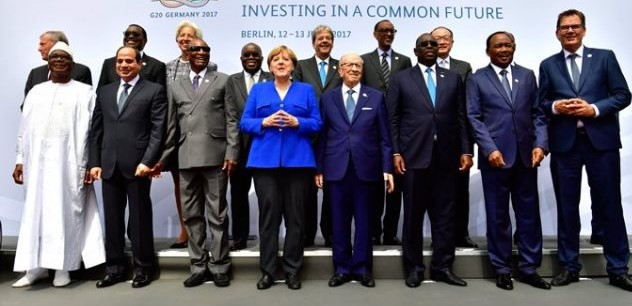Established in 1999, the G-20 is a forum for governments and central banks governors from the world’s top 20 economies.
It provides a platform for studying, reviewing and promoting high-level discussion of public policy issues particularly, those regarding international financial stability or a healthy global economy.
Its membership includes 19 individual countries as well as the European Union representing its member states.
This year’s edition of the summit is scheduled to take place next Month – July in Hamburg.
However, ahead of that the summit, Germany, chair of the forum under the leadership of Chancellor Merkel, advocated for greater inclusion of the developing nations especially those from Africa.
That resulted in the G-20 Africa conference which took place at Berlin, Germany from Monday 12th to Tuesday 13th June 2017 with the theme: “Compact with Africaâ€.
The G-20 leadership believes that a thriving global economy requires partnership between these strongest economies with the African continent through its governments.
In a statement issued to the press ahead of the conference, Germany’s Chancellor - Angela Merkel through her spokesperson said: “G20 Africa Partnership, Investing in a Common Future†conference is “to strengthen cooperation for sustainable economic development of African statesâ€.
It had in attendance Ghana’s President Nana Akufo - Addo, his counterparts as well as government representatives from Egypt, Mali, Ethiopia, etc., not including South Africa who was until the conference the only participating or member African nation in the G-20.
Chancellor Merkel, along with the other leaders of the forum including the head of the International Monetary Fund sighted growing level of immigration of young Africans to Europe as the main basis for the proposed broad African states inclusion in the G-20.
She stated that, “If we don’t give young people any prospects, if we don’t invest in education and qualifications, if we don’t strengthen the role of girls and young women, the development agenda won’t succeedâ€. Noting that an African youth without hope for opportunity will be compelled to seek it elsewhere.
“By working together with you for your countries, we will create more security for ourselves and put people smugglers out of business “, she added.
As a convention and no less significance, the fact that Africa is the subject here, there are skepticisms about the real impact of the G-20 on African states and the continent as a whole.
Is immigration, or its root gross youth unemployment and poverty of the masses the real concerns of these powerful nations?
How could one even discuss this critical subject of African development without addressing the issue of an unfair global market place: where food or agricultural products from African companies are largely suffocated by Western government-backed enterprises that produce the same products with equal if not higher quality at embarrassingly low cost (facilitated by their superior technology)?
How can the IMF for instance, prove its legitimacy as a global financial umpire for the weak and strong nations alike when its monetary/fiscal dictates, fueled by the influence of some if not all of the G-20 member states make it almost impossible for countries like Ghana who look to it for funding to decide their own fuel prices, or a free-hand to set measures to boost its domestic currency value to a level that is health for international trade?
Like the 45th President of the United States of America, Donald J. Trump famously said at his 2017 Inaugural, “it is the right of all nations to put their own interest first†but when such interest overextends beyond the those of other nations, nonetheless when they are weaker ones, restrain becomes the only course of action.
Hence, Africa perhaps is not in need of another G-20 Africa conference as many enlightened Africans would admit: Africa is in need of first, responsible governments across its nation states and a community of stronger nations as well as global institutions that hold true to the standards on international trade or other bilateral relations which they themselves advocate.
Only then, can a continent with enormous natural and human resources at the statue of Africa, experience true and sustainable development and the need for its young people to seek opportunities in the Western world, positively undermined.





